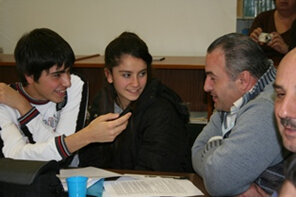
Training sessions
Students’ training
26 February, 27 February, and 5 March 2011 at USJ premises.
These sessions clarified the role that oral history plays, and trained the students in oral history techniques.
In total 44 students, representing 12 schools, participated in the presence of their teachers. Liliane Kfoury, Marie-Claude Souaid, and Lynn Maalouf led the three trainings. First a film called ‘War Stories’ was shown to the students. ‘War Stories’ was made by school students in 2009, and tackled the topic of the war. Students were asked to take notes during the screening, in order to put down their thoughts, impressions and comments about the content of the film. This helped generate the discussion and raise awareness about similar experiences of other students. They were asked to share the reasons why they wanted to participate in this project; many spoke about the desire to better understand the reasons for the war, or the more historical/political/military narratives of the war. Many also spoke about the need to understand the conflict and its roots, so that it is not repeated.
Additionally, a number of students identified their lack of knowledge and the consequences of not fully understanding these past experiences:
"We did not live through the war. We want to understand how it’s affecting us today," one student said. Another added, "We live in this constant fear of war re-erupting... Why is this? I want to understand what happened; otherwise this fear will always be there."
The students were then trained to prepare and conduct interviews, and collect oral testimonies on sensitive topics. The various questions to be addressed during the interview were discussed, the methodology for preparing the questionnaire and how to conduct an interview were explained, and the students were shown how to use the digital audio-recorder, and to archive the document.
The trainers emphasised that the goal was to collect the “human” stories; stories about situations that their elder relatives have lived through, but don’t necessarily talk about at home. Students would be responsible for creating something entirely new: an archive of lived histories during the conflicts in Lebanon. They were encouraged also to start thinking about ways to use this material that they would be creating, beyond the process of creating this archive; how to also become an end user of it. Teachers were also encouraged to do the same, and to start thinking of ways in which this project could be used in their institutions to share with a wider number of students.



Teachers’ training
19 February, 2011 at USJ premises, CEMAM offices.
A training was held for the teachers who volunteered to participate in this project. In total, 12 schools were represented.
Mr. Piers Pigou, member of the South Africa Historical Archive (SAHA), with a background in oral history techniques, was invited from South Africa to spend a week with the trainers to provide advice and material on the set of trainings for both teachers and students, and to facilitate the teachers’ training.
Mr. Pigou provided an overview of oral history, and examined various issues related to the purpose, process, and practice of oral history. He emphasised that this project was an investment in a longer-term process, and that the teachers were themselves the most important resource in this process. He highlighted that all societies, at one point or another, have had to engage with their past, but that this was a particularly important process for societies emerging from periods of conflict.
Father Granian then followed, discussing his book ‘An Armenian in Uncertain Times’; a memoir which narrates the years between 1973 and 1983. He talked mainly about the impact of the war and its violence on the Armenian community, and how the community survived yet another traumatic period in its history.
Following both presentations, a short film was screened to share one of SAHA’s projects, ‘Meeting History Face to Face’, to show the teachers a very similar project which was carried out in Johannesburg. The SAHA project encouraged teenage students to collect oral history testimonies about the apartheid period. The film shows testimonies from these students, explanations from their teachers, and how this project was embedded within a much wider project of memorialization around the apartheid period.
During the trainings the teachers often expressed the view that the past needed to be tackled, and that while there was great curiosity among their students to learn about their recent history, they, as educators, lacked the material and tools to teach it to them.
One teacher said: “this project is very important, very deep. We have a problem in our history; all the history books have no indication of the Lebanese identity, the Lebanese nation;”
Another said: “At schools, we play ostrich. We should open the wounds, because they are open anyway. Not pretend it never happened. All this collective memory, the students don’t know it. Unfortunately in Lebanon, our history repeats itself.”
The ensuing discussion served to examine the themes that should be addressed in the questionnaire, the logistics of the project and its implementation with the students, ways to accompany the students through the project, and other issues.